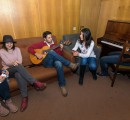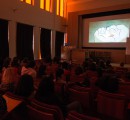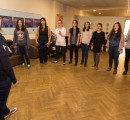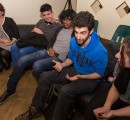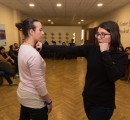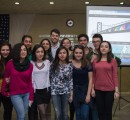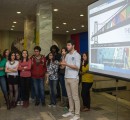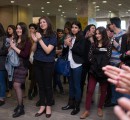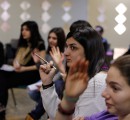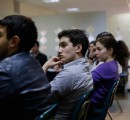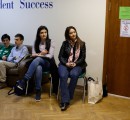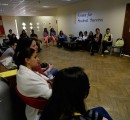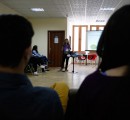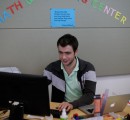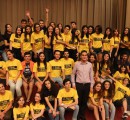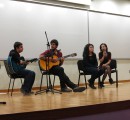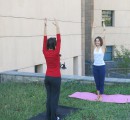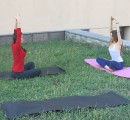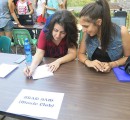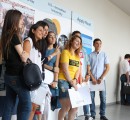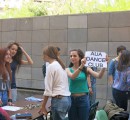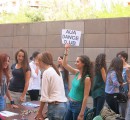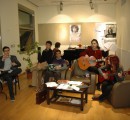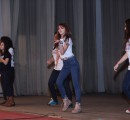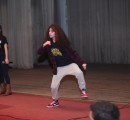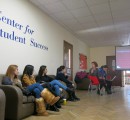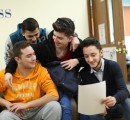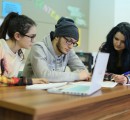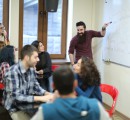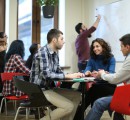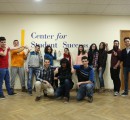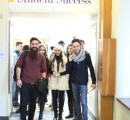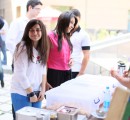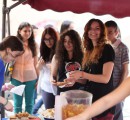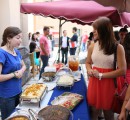
Two Years Later, AUA’s Center for Student Success is Paving the Way for Student Services in Armenia
5 min readYEREVAN, Armenia – It’s been two years since the American University of Armenia (AUA)’s Center for Student Success (CSS) first opened its doors to provide valuable student services to its 281 incoming undergraduates. Within that time, the CSS has provided over 1400 math and writing consultations and conducted over 100 workshops and presentations, while at the same time providing a warm and welcoming ‘home away from home.’ Now, with over 1000 undergraduates, the CSS is more valuable than ever.
As an American university, AUA has continuously strived to reflect the academic values and practices in America. Offering student support services, such as math and writing tutoring, advising support, counseling, disabilities services, and workshops is a staple in most educational institutions in the U.S. With the launch of AUA’s undergraduate program in 2013, it became necessary to follow those examples by establishing a dedicated center and providing, for the first time in Armenia, comprehensive student services.
Garine Palandjian, Student Services Manager, has worked to ensure that the second floor, west wing of AUA’s Main Building is both a place of learning and a place of support. “The objective for the founding of the center is to help students understand that education is a holistic process, it’s not just a classroom education and what you get from the instructor. It’s more than that – it’s an opportunity to break barriers, conquer fears, and grow academically and personally,” she said.
One way the CSS seeks to do this is by providing advising support. Twice a week, students can drop by the CSS, or make an appointment in advance, and discuss whatever struggles or issues they may be having. This is different from advising that faculty provide, which mainly centers on a student’s course selection and assignments.
For those seeking support for coursework, the Math and Writing Center serves as a chance for students to gain a deeper understanding of the concepts they’ve learned in the classroom, as well as gain access to trained and accomplished writers and mathematicians specially hired by AUA to provide quality and effective tutoring services. While not every student has learned to take advantage of these services, “those that do understand the value and are usual customers have really blossomed and improved their math and writing skills,” says Palandjian. Nerses Arabian, an English & Communications sophomore, stated, “I’ve used the Math and Writing Center several times and it’s been totally effective. The instructors have helped me a lot.”
One of the most popular services the CSS provides is workshops, which cover a wide range of topics geared toward student success, such as how to read and understand a syllabus, how to give a Power Point presentation, public speaking skills, and more. For undergraduates who are just starting to get used to the American model of university life, or for students who really want to get the most out of their education, these workshops provide an alternative platform for learning that they can’t get in the classroom.
The availability of disabilities support services is also an important factor as to why the CSS is such an integral part of the university. Through the CSS, AUA has taken care to provide services to those with mental or learning disabilities, while still ensuring confidentiality. If a student wishes to identify their disability, they fill out a questionnaire provided by the CSS, which then coordinates meetings between students and faculty – a very unique system in Armenia. In fact, in a February 2015 Unison NGO report evaluating 29 higher education institutions, AUA was the only institution in the country to be physically accessible and to have developed policies for organizing the educational process for students with disabilities. While this has been part of the university’s mission since the day it opened its doors in 1991, the CSS is now doing its part to expand the services that the university can provide.
On an average day, it’s common to find groups of undergraduates lounging on the CSS couches, or gathered around a table working on their homework. Even in its two short years of operation, it has become a place of comfort, and a favored meeting place. This past year, usage of the CSS went up nearly 40%, which makes sense considering the increase in undergraduate enrollment. And although the center is designed for the needs of AUA’s undergraduate population, it doesn’t turn away graduate students who wish to use their services.
For undergraduates, the CSS is also the place to go for those who have an idea for a new student club. Currently, there are 12 established clubs, ranging from drama, dance, and writing, to Japanese culture, with involvement from over 250 students. Most recently, an independent student newspaper was established, called The Bridge, which is run entirely by undergraduate volunteer journalists. These clubs provide an opportunity for students to explore their interests, make new friends, be creative, and develop unique skills. It supports the center’s mission of providing a holistic education that nurtures all areas of a student’s life. “Being a part of a student club makes the college experience much more enjoyable,” says Noemi Acopian of the Drama Club. “I am much more enthusiastic about the club than when we formed because we have grown and improved together and can handle more challenging plays.”
The CSS also prides itself on its annual celebrations, such as International Education Week and Women’s Day. With the university increasing its number of international students, it’s especially important that the CSS takes on its role as a champion of diversity and culture. International Education Week, a joint initiative of the U.S. Department of State and the U.S. Department of Education, aims to recognize and celebrate the benefits of international education and exchange worldwide. This past year, AUA celebrated with an international food festival, home country presentations given by international students, informational talks, and much more. For a university whose student body comes mostly from Armenia, it’s an invaluable educational opportunity that opens the door to learning about global cultures.
Similarly, Women’s Day is widely celebrated throughout the university. In 2015, AUA held a weeklong series of events, workshops, exhibitions, and more, using the holiday as a platform to discuss women’s issues, gender equality, and to honor women in general. While women’s studies still remains a mostly unexplored field in Armenia, the CSS is attempting to expose AUA students to the importance of the topic. In fact, it was the students themselves who approached Palandjian with new and innovative ways to express themselves during the week of events, such as holding an art exhibition of works by female students, staff, and faculty.
Despite all that it has managed to do in the past two years, the CSS still has much to accomplish. Most importantly, it hopes that more students realize its value and take advantage of everything it has to offer. “I think it’s the biggest secret on campus right now. In reality I think some of our students haven’t understood what the value is and it’s probably because students are not used to seeking support,” said Palandjian. In the last year, Palandjian has been trying new ways of increasing the institutional profile of the CSS. She’s started a Facebook page for the center, and now writes a seasonal newsletter with helpful tips, insights, and information related to past and upcoming events and workshops. The CSS is also in the process of building a professional team, establishing a contract with a professional counselor and hiring additional writing consultants.
Counseling Services is a new student support service available to all AUA students starting this fall 2015. The counselor will be able to meet with students for one-on-one or group consultation sessions, and will also provide workshops periodically for the center.
With the new fall 2015 class of undergraduates, students can look forward to getting the support they need. “I think students know that they can come and ask any question and even if we don’t have an answer we can direct them,” Palandjian said. “Before, this was just a hallway. Now it has become much more.”
Founded in 1991, the American University of Armenia (AUA) is a private, independent university located in Yerevan, Armenia and affiliated with the University of California. AUA provides a global education in Armenia and the region, offering high-quality, graduate and undergraduate studies, encouraging civic engagement, and promoting public service and democratic values.

